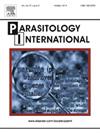Comparison of prevalence and strongyle egg counts per gram of feces in horses at pasture and in stables following ivermectin/praziquantel treatment
IF 1.5
4区 医学
Q3 PARASITOLOGY
引用次数: 0
Abstract
Equine strongyle infections are prevalent among grazing horses worldwide, yet research on anthelmintic efficacy and parasite management strategies in South Korea remains limited. This study investigated the infection dynamics and parasite burden in horses managed under different systems (pasture vs. stable) over a one-year period in Jeju, South Korea, assessing the impact of management practices on parasite burden and the effectiveness of current deworming regimens. Thirty-two horses were administered ivermectin/praziquantel in June 2022 and assigned to either pasture (n = 16) or stable (n = 16) groups. Each group was further divided based on deworming intervals (3–6-3 months vs. 9–3 months). Monthly egg per gram (EPG) counts of strongyle eggs were conducted to evaluate seasonal variations in parasite burden. Results indicated that stabled horses maintained near-zero EPG levels year-round, whereas pasture-managed horses exhibited significant seasonal fluctuations, with EPG values peaking in summer and autumn before declining in spring. Deworming intervals had minimal impact on parasite burden in stabled horses. However, pasture horses showed varying reinfection risks, with the highest EPG value increase occurring in summer. These findings suggest that routine three-month deworming may be excessive for stabled horses but adequate for pasture-managed horses due to higher reinfection rates. Instead, targeted selective treatment based on EPG monitoring is recommended as a more effective and sustainable parasite control strategy to optimize deworming regimens and mitigate anthelmintic resistance.

伊维菌素/吡喹酮治疗后牧场和马厩马粪便中圆形线虫的流行率和每克粪便中圆形线虫卵数的比较
马蛔虫感染在世界各地的食草马中普遍存在,但韩国对驱虫效果和寄生虫管理策略的研究仍然有限。本研究调查了在韩国济州岛为期一年的不同管理系统(牧场与马厩)下马的感染动态和寄生虫负担,评估了管理实践对寄生虫负担的影响以及当前驱虫方案的有效性。于2022年6月给32匹马注射伊维菌素/吡喹酮,并将其分为放牧组(n = 16)和马厩组(n = 16)。各组按除虫间隔(3-6-3 个月vs. 9-3 个月)进一步分组。对圆形虫卵进行每月每克卵数(EPG)计数,以评价寄生虫负荷的季节变化。结果表明,圈养马全年EPG水平保持在接近零的水平,而放养马EPG表现出明显的季节性波动,夏季和秋季EPG值达到峰值,春季EPG值下降。驱虫间隔对马厩马的寄生虫负荷影响最小。然而,放牧马的再感染风险不同,EPG值在夏季升高最高。这些发现表明,对于马厩的马来说,常规的三个月的驱虫可能过多,但对于牧场管理的马来说,由于再感染率较高,驱虫是足够的。相反,基于EPG监测的有针对性的选择性治疗被推荐为一种更有效和可持续的寄生虫控制策略,以优化驱虫方案并减轻驱虫虫的耐药性。
本文章由计算机程序翻译,如有差异,请以英文原文为准。
求助全文
约1分钟内获得全文
求助全文
来源期刊

Parasitology International
医学-寄生虫学
CiteScore
4.00
自引率
10.50%
发文量
140
审稿时长
61 days
期刊介绍:
Parasitology International provides a medium for rapid, carefully reviewed publications in the field of human and animal parasitology. Original papers, rapid communications, and original case reports from all geographical areas and covering all parasitological disciplines, including structure, immunology, cell biology, biochemistry, molecular biology, and systematics, may be submitted. Reviews on recent developments are invited regularly, but suggestions in this respect are welcome. Letters to the Editor commenting on any aspect of the Journal are also welcome.
 求助内容:
求助内容: 应助结果提醒方式:
应助结果提醒方式:


